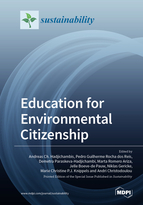Education for Environmental Citizenship
A special issue of Sustainability (ISSN 2071-1050). This special issue belongs to the section "Sustainable Education and Approaches".
Deadline for manuscript submissions: closed (31 May 2022) | Viewed by 54623
Special Issue Editors
Interests: education for environmental citizenship; environmental citizenship; environmental education; sustainability education; biology education; science education; socio-scientic issues; teacher professional development
Special Issues, Collections and Topics in MDPI journals
Interests: science education; youth activism; socioscientific and socio-environmental issues; environmental citizenship; teachers' professional development
Special Issues, Collections and Topics in MDPI journals
Interests: environmental education; environmental citizenship; teacher professional development; biology education; science education
Interests: Environmental citizenship; environmental education; science education; teacher professional development; inquiry-based learning; socio-scientic issues
Interests: environmental education; citizenship education; urban education; STEM education; school effectiveness; implementation studies; teacher professional development; assessment
Interests: biology education; conceptual understanding; implementation research; models and representations; science education; sustainability education; textbook research
Special Issues, Collections and Topics in MDPI journals
Interests: Socio-scientific issues; responsible citizenship; biology education; systems thinking; environmental citizenship; socio-scientific inquiry-based learning; teacher professional development; model-based reasoning in biology
Special Issue Information
Dear Colleagues,
A series of existing environmental problems (both global and local) constitute the scenery of environmental crises. Environmental citizenship is recognized as an important aspect in addressing global environmental crises (Stern 2011; Ockwell et al. 2009).
Education for Environmental Citizenship (EEC) is the type of education that cultivates a coherent and adequate body of knowledge as well as the necessary skills, values, attitudes, and competencies that an environmental citizen should be equipped with in order to be able to act and participate in society as an agent of change in the private and public sphere, on a local, national and global scale, through individual and collective actions. It pushes them toward solving contemporary environmental problems, preventing the creation of new environmental problems, in achieving sustainability as well as developing a healthy relationship with nature. ‘Education for Environmental Citizenship’ empowers citizens to practise their environmental rights and duties, as well as to identify the underlying structural causes of environmental problems, develop the willingness and the competencies for critical and active engagement and civic participation to address those structural causes and act individually and collectively within democratic means, taking into account both inter- and intra-generational justice (ENEC 2018).
The scope of this Special Issue is to provide a platform for researchers to share their research work on the field of education for environmental citizenship including aspects of civic engagement and civic participation, democratic action, social and environmental change, individual and collective actions, environmental actions, socio-political actions, environmental justice, inter- and intra-generational justice and connectedness to nature.
In this Special Issue, we encourage researchers to submit empirical, theoretical, methodological research articles or reviews in various fields considering EEC, for instance, in the frameworks of formal and non-formal education. Submissions using qualitative, mixed method, or quantitative research approaches are welcome.
References:
European Network for Environmental Citizenship – ENEC (2018). Defining “Education for Environmental Citizenship”. Retrieved from http://enec-cost.eu/our-approach/education-for-environmental-citizenship/
Ockwell, D., Whitmarsh, L., & O'Neill, S. (2009). Reorienting climate change communication for effective mitigation: Forcing people to be green or fostering grass-roots engagement? Science Communication, 30(3), 305–327.
Stern, P. C. (2011). Contributions of psychology to limiting climate change. American Psychologist, 66(4), 303.
Dr. Andreas Ch. Hadjichambis
Dr. Pedro Guilherme Rocha dos Reis
Dr. Demetra Paraskeva-Hadjichambi
Dr. Marta Romero Ariza
Dr. Jelle Boeve-de Pauw
Dr. Niklas Gericke
Dr. Marie Christine P.J. Knippels
Dr. Andri Christodoulou
Guest Editors
Manuscript Submission Information
Manuscripts should be submitted online at www.mdpi.com by registering and logging in to this website. Once you are registered, click here to go to the submission form. Manuscripts can be submitted until the deadline. All submissions that pass pre-check are peer-reviewed. Accepted papers will be published continuously in the journal (as soon as accepted) and will be listed together on the special issue website. Research articles, review articles as well as short communications are invited. For planned papers, a title and short abstract (about 100 words) can be sent to the Editorial Office for announcement on this website.
Submitted manuscripts should not have been published previously, nor be under consideration for publication elsewhere (except conference proceedings papers). All manuscripts are thoroughly refereed through a single-blind peer-review process. A guide for authors and other relevant information for submission of manuscripts is available on the Instructions for Authors page. Sustainability is an international peer-reviewed open access semimonthly journal published by MDPI.
Please visit the Instructions for Authors page before submitting a manuscript. The Article Processing Charge (APC) for publication in this open access journal is 2400 CHF (Swiss Francs). Submitted papers should be well formatted and use good English. Authors may use MDPI's English editing service prior to publication or during author revisions.
Keywords
- education for environmental citizenship
- environmental citizenship
- sustainability education
- justice-oriented education
- transformative education
- change-oriented education
- sustainable citizenship education
- global citizenship education
- civic participation
- civic engagement
- agents of change
- environmental behavior
- collective action
- sustainable development goals
- citizenship education








